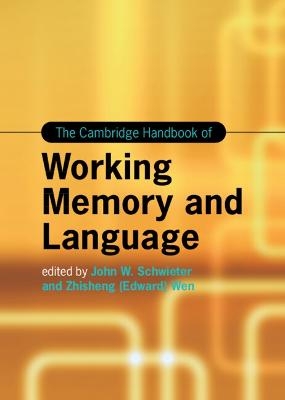
The Cambridge Handbook of Working Memory and Language
Cambridge University Press (Verlag)
978-1-108-84534-2 (ISBN)
Bringing together cutting-edge research, this Handbook is the first comprehensive text to examine the pivotal role of working memory in first and second language acquisition, processing, impairments, and training. Authored by a stellar cast of distinguished scholars from around the world, the Handbook provides authoritative insights on work from diverse, multi-disciplinary perspectives, and introduces key models of working memory in relation to language. Following an introductory chapter by working memory pioneer Alan Baddeley, the collection is organized into thematic sections that discuss working memory in relation to: Theoretical models and measures; Linguistic theories and frameworks; First language processing; Bilingual acquisition and processing; and Language disorders, interventions, and instruction. The Handbook is sure to interest and benefit researchers, clinicians, speech therapists, and advanced undergraduate and postgraduate students in linguistics, psychology, education, speech therapy, cognitive science, and neuroscience, or anyone seeking to learn more about language, cognition and the human mind.
John W. Schwieter is Professor of Spanish and Linguistics, and Director of Bilingualism Matters at Laurier and the Language Acquisition, Multilingualism, and Cognition Laboratory at Wilfrid Laurier University. He is Executive Editor of Bilingual Processing and Acquisition and Co-Editor of Cambridge Elements in Second Language Acquisition. Edward Z. S. Wen is Associate Professor at Macao Polytechnic Institute in Macau. He has extensive teaching and research experience in applied linguistics, second language acquisition and cognitive science. He has authored and edited volumes on working memory and language aptitude with Cambridge University Press, Routledge, John Benjamins and Multilingual Matters.
1. Working memory and language: an overview of key topics; Part I. Introduction: 2. Working memory and the challenge of language; Part II. Theoretical Models and Measures: 3. The evolution of working memory and language; 4. The phonological loop as a 'language learning device': an update; 5. The Embedded-Processes Model and language use; 6. Long-term working memory and language comprehension; 7. The cognitive neuroscience of working memory and language; 8. Computational models of working memory for language; 9. The time-based resource sharing model of working memory for language; 10. The Ease of Language Understanding Model; 11. Assessing children's working memory; 12. Measuring individual differences in working memory capacity and attention control and their contribution to language comprehension; Part III. Linguistic Theories and Frameworks: 13. Have grammars been shaped by working memory and if so, how?; 14. Branching and working memory: a cross-linguistic approach; 15. Working memory and natural syntax; 16. The role of working memory in shaping syntactic dependency structures; 17. Working memory in the Modular Cognition Framework; 18. Short-term and working memory capacity and the language device: chunking and parsing complexity; Part IV. First Language Processing: 19. Working memory in word reading; 20. The role of working memory in language comprehension and production: evidence from neuropsychology; 21. Working memory and high-level text comprehension processes; 22. Working memory and speech planning; 23. How do novice and skilled writers engage working memory?; Part V. Bilingual Acquisition and Processing: 24. How measures of working memory relate to L2 vocabulary; 25. Working memory and L2 grammar development in children; 26. Working memory and L2 grammar learning among adults; 27. Working memory and L2 sentence processing; 28. Methodological issues in research on working memory and L2 reading comprehension; 29. Working memory and second language speaking tasks; 30. Working memory in second language interaction; 31. Working memory and interpreting studies; 32. A methodological synthesis of working memory tasks in L2 research; Part VI. Language Disorders, Interventions, and Instruction: 33. Specific learning disorders as a working memory deficit; 34. A new perspective on the connection between memory and sentence comprehension in children with developmental language disorder; 35. Working memory and childhood deafness; 36. Working memory training in the classroom; 37. Working memory and classroom learning; 38. Cognitive load theory and instructional design for language learning; 39. Working memory training: meta-analyses and clinical implications; Part VII. Conclusion: 40. Towards an integrated account of working memory and language; Index.
| Erscheinungsdatum | 11.07.2022 |
|---|---|
| Reihe/Serie | Cambridge Handbooks in Language and Linguistics |
| Zusatzinfo | Worked examples or Exercises |
| Verlagsort | Cambridge |
| Sprache | englisch |
| Maße | 173 x 250 mm |
| Gewicht | 2036 g |
| Themenwelt | Geisteswissenschaften ► Sprach- / Literaturwissenschaft ► Sprachwissenschaft |
| ISBN-10 | 1-108-84534-7 / 1108845347 |
| ISBN-13 | 978-1-108-84534-2 / 9781108845342 |
| Zustand | Neuware |
| Informationen gemäß Produktsicherheitsverordnung (GPSR) | |
| Haben Sie eine Frage zum Produkt? |
aus dem Bereich


